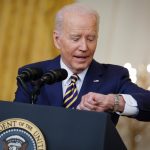
By Ambassador John Bolton
This article first appeared in the Washington Examiner on June 27th, 2022. Click here to see the original article.
This week, President Joe Biden attends the G-7 summit in Germany and a NATO summit in Spain.
These meetings of the free world’s major economic powers and its paramount political-military alliance are particularly significant. America and its allies, seeking recovery from the coronavirus pandemic, have spent their way into dangerous inflation and the face grim prospect of an imminent recession. NATO is engaged in proxy military hostilities with Russia in Ukraine as Europe’s worst land war since 1945 grinds on, producing death, destruction, and global economic consequences. Looming above all else is China, the existential threat for the West’s foreseeable future.
In Henry Luce’s “American Century” (his 1941 aphorism), these diverse, menacing circumstances evoked calls for U.S. leadership to solve the West’s problems. Such calls still ring out today, but few seem to know what they mean. In the United States, the low-grade infection of isolationism persists, questioning why events in the wider world should concern us so much. Ironically, this skepticism is reinforced by reflexive demands for “leadership” that prize heading the parade without actually knowing where the parade is going. It is, therefore, entirely appropriate to consider what “American leadership” means and why we have it.
We should dispense first with the myth that from independence, America had an almost entirely domestic focus, emerging only reluctantly into international affairs in World War I. Hardly. Transforming 13 weak colonies into a transcontinental giant was no mere domestic affair, marked as it was by foreign conflicts — starting with the undeclared 1798-1800 Quasi-War with France and against Barbary pirates in 1801-1805, as well as huge territorial expansion, culminating in 1900 with U.S. control over distant lands such as Alaska, Hawaii, and the Philippines.
This is not the history of an insular, inward-looking people but the most successful and enduring expansion since ancient Rome. The immeasurable economic capabilities resulting from territorial growth, the flood of immigrants to America, and our determination to maintain free, constitutional, representative government, along with soaring trade, travel, and communications, created the basis on which modern U.S. leadership rests. Three hot wars in Europe in less than a century, starting with the 1870-1871 Franco-Prussian War, followed by the Cold War, did the rest, decimating Europe and ending its global empires.
China’s empire is now the last one standing. Nostalgia for quieter times internationally has been out of date for at least a century. The issue today is whether to continue the way of life we now enjoy by acting in our own interests, together with friends and allies, to protect against common threats. It is a false choice to think we can turn away from the rest of the world and bear no consequences domestically for doing so. We exercise international leadership because we thereby better protect America’s interests, not because we feel charitable toward others. We can choose to abandon U.S. interests, as some advocate, but make no mistake: No one else will protect them for us. The absence of American global leadership produces not greater stability but either growing anarchy or the emergence of hostile powers seeking to advance their interests to our disadvantage.
President Biden should demonstrate this week that America is still capable of providing leadership to confront unprovoked aggression, whether from Russia or China; handle our economies responsibly, undistracted by fanciful economic theories and social ideologies; and strategize on global challenges ahead. Whether Biden is capable of so doing is entirely another question, and his record does not provide much confidence.
NATO is not as allied with Ukraine as the president’s rhetoric suggests; he apparently has no idea that heedless expansion of the money supply has created the inflation now endangering the global economy, and whether he understands the China threat remains to be seen. The real test of U.S. leadership lies not in international diplomatic theatrics, but in hard battles over seemingly mundane, often mind-numbing subjects like the federal budget. One such ongoing struggle is over the size of our defense budget, which has suffered for 30 years since the collapse of the Soviet Union. Lulled into spending the “peace dividend” in non-defense areas, the West’s ability to deter and resist growing global threats has not kept pace.
Even as domestic government spending needs drastic reductions to combat inflation, we also need a significant increase in defense capabilities across the full spectrum of military threats. The 2024 presidential contest has already begun. It is not too soon, during 2022’s congressional campaigns, to debate not just budget numbers but America’s place in the world and why our international leadership benefits us and our allies. Our greatest strength is not our political leaders but the people themselves. Treated like adults by politicians, we are fully capable of doing what is required to safeguard our way of life. Let’s see which candidates grasp that reality. There we will find the next president.
John Bolton was national security adviser to President Donald Trump between 2018 and 2019. Between 2005 and 2006, he was the U.S. Ambassador to the United Nations.